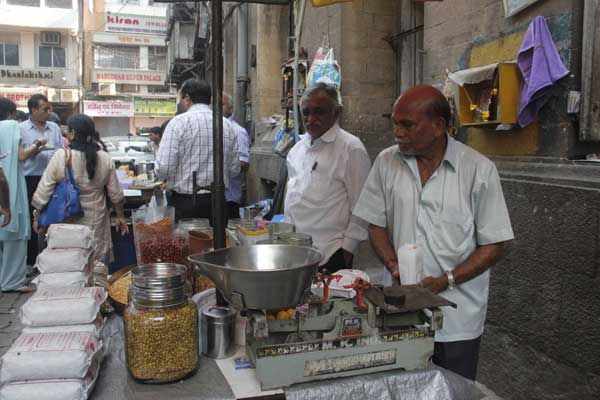Dealing with NRI-fans who throng Mumbai’s Khau Gallis for for street food for 30 years, the expert eyes of Ganesh knew that this expat “Madamji” held huge potential.
She is not going to just ask him to “parcel” some samosa, puri-bhaji or may be a “masala dosa….paper dosa,” but also say “Baaki Rakh Lo…” (keep the change), Ganesh speculated. To be in Mumbai and not to speculate in business deals does not go hand-in-hand.
While giving him a Rs 500 note to settle the bill, Ganesh assumed, she is most likely to say this like any other People of Indian Origin (PIO) who make a beeline to his street food kiosk.
Most expats are very generous, rarely demanding the change from owners of make-shift Khau Galli shop owners — road-side kiosks at Fort in Mumbai.
Ganesh vigorously badgered Bhola, his 20-year old son, to attend to Reshmi Patel while he dealt with her husband Nimesh.
Born and brought up in the Fort area of Mumbai, Ganesh Sau first began his thela (push cart) selling samosas and later diversifying into sundry other edible including the most favourite dish of Mumbaikars: vada pav. Khau Galli is dear to them as their fathers and forefathers too would come to eat there.
“Oh my God! It looks so fabulous, it has to be delicious too…. Let’s have some chat and pav bhaji,” Reshmi said to Ganesh. Nimesh laughingly said, “Bhaiya ek plate masala pav aur bhelpuri dijiyega…. butter thoda jyada lagana bhaiya pav pe….”
Ganesh knows the behavior of the young NRIs, but not so young Bhola who was busy entertaining others. But father’s clamor forced him to be extra cautious towards “Madamji’s” husband.
The cluster of Indian street food stalls in the narrow, dingy, small bylanes of Mumbai has not only been gratifying the taste buds, but also hearts for decades. People throng to the stalls especially during lunch hours when office workers stop by for quick bites.
Mumbai has several Khau Gallis around every major commercial and college hub — diamond market near Opera House, populated local railways stations, such as Andheri, Churchgate, Ghatkopar, Lower Parel, etc. Mumbai’s Khau Galli has become an essence of the city and an ultimate paradise for food lovers. It breaks the barriers of wealth as everyone enjoys the savories. The wealthy relish the taste and those not so rich appreciate the lesser strain on their wallet.
Neither rain not heat pulls the shutters on businesses in these lanes. The Khau Galli of Zaveri Bazaar is the happening street for food lovers and shoppers. People shopping for jewellery make a pit stop at Khau Galli for Chinese bhel, vada pav (a Mumbai speciality), dosas sandwiches, ragda pattice, bhelpuri, sev puri, dahi puri and to quench your thirst sugarcane juice, milk shakes, kulfi, cold drinks and more.
Khau Gallis are an integral part of Mumbai’s metropolitan life. Here, flop actors and actresses rub shoulders with established cine-stars and auto rickshaw drivers order munch on bada pav or samosa standing beside company executives.
Khau Galli’s true innovation lies in the scores of different variations and styles on offer for every dish. Virtually every snack served has sub variations to cater to your tastes buds.
Khau Galli is not just about the food though. It is also a meeting and social hub. At Dalal Street’s Khau Galli, stock brokers trade their stock tips while grabbing mini meals. Who knows, perhaps some lip-smacking meals have loosened lips into spilling some stock tips.
It is the place to gripe about office politics and a hangout for college kids.
Australian based computer engineer Vishal Khatri, who was born and brought up in Mumbai, is visiting India to meet his parents. The 30-year-old computer engineer is at the Fort Khau Galli for his fix, water bottle in hand, seemingly oblivious to the poor hygiene at most Khau Galli food stalls.
He ponders the choice of masala dosa, sandwiches, pani puri, masala khichiyas…. Recalling his experience of Indian street food, he waxes nostalgic about his college days and his Khau Galli adda (hangout).
Meanwhile, Ganesh wants his son Bhola to develop an “NRI sense” in dealing with the Rashmis and Nimeshes. Ganesh insists that he must learn to distinguish between a NRI and a local Mumbaikar. His wife, Shanti concurs. Keep the peace.
